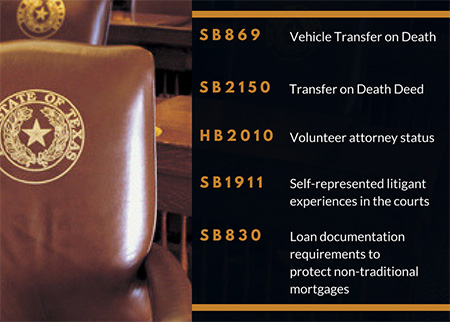UPDATE | By Harry M. Reasoner, Chair

The 85th Legislative Regular Session ended May 29, but the impact from pro “access-to-justice” bills is just beginning. Once again, under the leadership of the Supreme Court, the Texas Access to Justice Commission and other access to justice institutions worked hard to preserve general revenue funding and to expand access to justice inside and outside the courts.
Funding
The Legislature faced an uphill battle in terms of the budget this session, and legal aid funding was not spared from the harsh realities of tight fiscal circumstances. Facing a complete removal from the General Revenue budget, access to justice advocates worked to educate legislative members and staff about the critical need to preserve legal aid funding. They were successful in preserving funds but at much lower levels than previous budgets. The final budget signed by the Governor contained $4.5 million in general revenue: $3 million for veterans’ legal services and $1.5 million for basic civil legal services. This amount is significantly lower than the near $20 million in funds requested by the Court. Thankfully, funds collected from the Chief Justice Jack Pope Act passed in 2013, will help make up for what is hoped to be a one-time cut to civil legal aid. Positively, the Legislature maintained the $9.6 million from the Court’s request for Legal Aid for Sexual Assault Survivors (LASSA) funding.
Non-Funding Priorities
It is clear that there will not be enough governmental funding nor pro bono volunteers to provide legal assistance to those who cannot afford it and who legitimately need it. Over the last two sessions, the Commission has sought to get legislation passed that makes access available to the unrepresented.
Alternatives to Probate
• Senate Bill 869 authored by Joan Huffman and Jessica Farrar in the House creates a Vehicle Transfer on Death (VTOD) process through the Texas Department of Motor Vehicles. As a part of our ongoing efforts to make the probate system more accessible to people who cannot afford a lawyer or to avoid it altogether, the Commission drafted the VTOD as an instrument for people to pass their cars outside the probate system. Similar to the Transfer on Death Deed the Commission helped pass last session, which allows people to pass clear title to real property upon their death, people will now be able to pass title to their vehicles upon their death without the expense of probate. The Texas Department of Motor Vehicles will be developing the exact process and forms required to execute a VTOD. Tentatively, it will be available in March 2018.
• Senate Bill 2150 authored by Joan Huffman and Jessica Farrar in the House amends the Transfer on Death Deed (TODD) statute to clarify that the application of the anti-lapse statute applies in all circumstances—a small but important change to ensure the TODD will be applied consistently in the future.
Assistance in Court
• House Bill 1020 by John Smithee and José Rodriguez in the Senate allows the Texas Supreme Court to promulgate rules allowing inactive members of the State Bar to practice law for the sole purpose of pro bono. This will open up an entirely new pool of attorneys who could help low-income Texans. Last year, there were more than 16,000 inactive attorneys. A joint committee of the Bar and the Commission also proposed changes to Article XIII of the State Bar Rules for the Court’s review that would govern the circumstances in which an inactive attorney could do pro bono. Those proposed changes were sent to the Court for review on June 27, 2017.
• Senate Bill 1911 by Judith Zaffirini and Jessica Farrar in the House aims to improve self-represented litigant experiences in the courts. The new law requires courts to post information for the public on where to get legal assistance, including local legal aid offices, lawyer referral services, and a self-help website to be designed jointly by the Office Court Administration and the Commission. Texas Appleseed, the Commission, Texas Legal Services Center, and the Office of Court Administration worked collaboratively on the language. Texas Appleseed worked on passage of SB 1911 and supported a floor amendment adding the language of House Bill 1021 by John Smithee. HB1021, which was delayed in committee, was drafted and supported by the Commission. SB 1191 clarifies that the law library filing fee funds can be used to offset self-help center expenses and also creates a way for law libraries to partner together to form a law library across county lines.
The overall effect of the 85th Legislature is a positive one for access to justice. The bills passed move us closer to reducing barriers for millions of Texans. The Commission, with the leadership of the Supreme Court and the support of the State Bar, will continue to seek ways to move closer to “justice for all.”
 Harry M. Reasoner is the chair of the Texas Access to Justice Commission and a partner at Vinson & Elkins in Houston, Texas. His principal area of practice is complex civil litigation, including antitrust and securities litigation. He is a Fellow of the American College of Trial Lawyers, the International Academy of Trial Lawyers, the International Society of Barristers, and the American Bar Foundation.
Harry M. Reasoner is the chair of the Texas Access to Justice Commission and a partner at Vinson & Elkins in Houston, Texas. His principal area of practice is complex civil litigation, including antitrust and securities litigation. He is a Fellow of the American College of Trial Lawyers, the International Academy of Trial Lawyers, the International Society of Barristers, and the American Bar Foundation.



